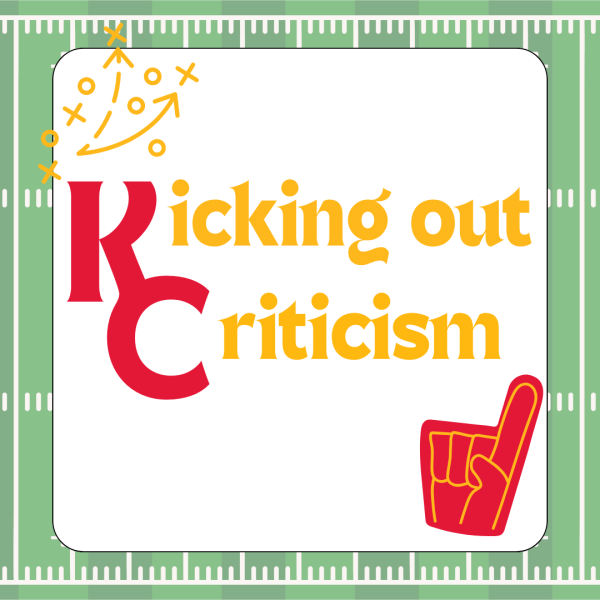Hollywood should rethink their decision before remaking movies
Movies can be remade out of anything; beloved classics, foreign majesties, cult films and concepts that were good in theory but just couldn’t get their point across coherently. However, the real question is, should they? There have been accomplishments among well known and considerably good movies, like director Brian De Palma’s remake of the 1932 classic Scarface. But how long will it take until the Harry Potter or Lord of the Rings franchises or other untouchable films are remade?
The first remake ever made was The Great Train Robbery in 1903, which ushered the movie making business into films that used camera movement, unlike it’s original that was merely a series of photographs. After that, several movies have been improved upon or have made a mockery out of their original. Freshman Matthew Claar said he describes a Hollywood remake as something that is “hyped up and then hated on,” due to audience’s high hopes for a movie.
“They have to be up to parr, and they have to be really good,” Claar said. “It’s like if they were to reboot Star Wars, they would have to spend so much money and they would have to do a great job or else people would just hate Star Wars. I think [director] George Lucas is being smart by just adding on to the timeline, following the trend of just adding on more installments and telling character’s backstories.”
Being overly excited for a remade movie to come out is not an unfamiliar concept to most people. Movies that had better advertisements than their actual film have proven to fool audiences time and time again. Students like Claar have caught on with some tactics Hollywood directors have used when recreating movies, and he said these trends are easy to pick out.
“Hollywood makes so many remakes because they know it will profit them,” Claar said. “When people see movies they know about or recognize, they are automatically more likely to see them. Especially if the movie they are remaking made a lot of money in the past. There are plenty of movies that are original, but I think that over time more and more movies are obvious money grabbing corporate cash outs. More companies are trying to make the most money they can, not the best movie they can.”
Remade films aren’t always bad, but have had more low points than high. Psychology teacher Dustin Leochner also said he has noticed the patterns of Hollywood’s search for the cheapest movie that will make them the most profit, and the concept of a remake is far from foreign to them.
“There’s a new spy type of movie coming out with Michael Keaton that’s supposed to be like Jason Bourne, but I think it’s called American Assassin,” Leochner said. “So it’s not a remake, but it’s a rehash in the same theme, and Hollywood knows those movies always do well. Another example would be Fast and Furious having eight sequels, that franchise is apart of a genre that always does well. I don’t think Hollywood has run out of ideas, I think they just stick to what works.”
Unoriginality and “sticking to what works” has left Hollywood’s pool of interesting movies nearly dry, as it seems to some that the risk-taking days are over. Remakes that are really out there are the ones that have been widely accepted by society, and most would agree that stepping outside of the box is much needed in today’s film industry. There are so many concepts that have been unexplored, and only going back to circle the same dead idea that has been beaten over and over again leaves room for unhappy audiences.
“My least favorite Hollywood remake would probably be Karate Kid– the kind of movies I really liked when I was a kid are the ones that I think should be left alone,” Leochner said. “I think when you try to recreate classic characters, like the Miyagi character, you know, there’s only one Mr. Miyagi. I think when you have an iconic movie that you’re trying to remake, or if the characters in that movie are iconic, I don’t think remaking those characters works.”
A concept that Harald Zwart’s 2010 remake of Karate Kid highlighted was a movie that did less than the original. The original Karate Kid was coined iconic by many, using humor and being one of the first installments of classic martial arts movies in modern American culture, and when it was remade using non-expressive actors on a poorly written script that didn’t capture the heart of the original, audiences were furious. Junior Nada Bayazid said she has also experienced a remake that ruffled her feathers.
“I’ve seen Death Note recently, and I know that it got a lot of really bad reviews,” Bayazid said. “I mean, some part of it wasn’t exactly like the show which bothered me. I was like, ‘why did they do that?’ They changed a lot of things in the movie that I didn’t really like, and it annoyed me. In the show, the main character didn’t tell anyone about the Death Note, and it was a big trait that defined his character, it showed the kind of person he was. In the movie, he told the girl he liked right away about it, which I thought was stupid and irresponsible, it took away from the whole point of that character.”
Despite some remakes being wildly incoherent, others have been adapted to better fit with the times.
“Red Dawn is my favorite remake,” Claar said. “I think it’s because the first one wasn’t great, it was interesting, but it needed something more. The remake used better actors and had a better director. Of course, the graphics were much better. It improved because the first movie was about the Russians attacking, and the reboot was about North Korea attacking. It took a concept that was cool but never fully explored and not only made better but made more timely.”
Though, according to Rotten Tomatoes.com, the original Red Dawn seemed to resonate more with audiences, the concept of making a film that didn’t fully explore the source material is one that should be more present in the current film making industry. According to some, a person’s opinion of a remake is invalid unless the person has seen the original, however, some beg to differ. A fresh perspective of a movie might just be Hollywood’s intentions when creating a remake.
“I think you probably need to wait a few decades to make a remake and introduce the new concept to an unfamiliar audience,” Leochner said. “If you remake something 10 years later, everyone will remember the original, and if the original was bad, they aren’t gonna see the remake. If the original was good, they’re gonna be thinking, ‘Why would you remake it? What can they do to improve it?’ But if you wait for another generation of moviegoers to come out, your remake will probably do better.”
This idea has been demonstrated countless times and will probably continue into the future due to it’s one underlying factor: it works. Bayazid’s experience when viewing the recent It remake is a perfect example of that.
“I thought it was pretty good, kinda creepy, and I’m pretty sure it was quite different from the first movie,” Bayazid said. “Like all the fictional characters they added, I always thought it was just the clown, but they added other things like the children’s fears represented by some weird looking creatures. I don’t think they had that in the first movie. I haven’t seen it, though.”
Though the It movie instantly became a horror classic, based on a beloved Stephen King novel, some millennials have criticized it for being “too boring” and focusing too much on the current situation that the grown-up versions of the better remembered children had to face. The remake took note of these criticisms and focused more on the childrens’ perspective. It did remarkably well at the box office, scoring the Warner Bros 123 million dollars on opening weekend after following the worst summer at the box office in 20 years, according to cnn.com. All in all, it’s hard to say whether or not Hollywood remakes are a good thing due to the innate diversity among them, stemming from considerably horrible to record-breaking box office success. However, there is room for Hollywood to learn from their past mistakes.
“A good rule of thumb is that if the first movie was good, don’t remake it,” Claar said. “If it was outstanding, build upon the story. There is room for it to grow, and that’s what Hollywood doesn’t understand because we have developed this ideology of, ‘If it’s good, do it again.’ But in all honestly, sometimes these good movies should have concepts explored, backstories explained, ect. Not the whole thing all over again.”

This is Olinger's second year on the Standard. She has absolutely loved being apart of the newspaper and has been since august, 2016. She won second place...











